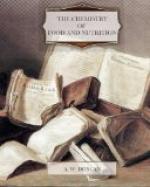carbon 4,500 grains (or 300 grammes), and nitrogen,
300 grains (or 20 grammes). Now let us suppose
a person to feed on bread only. In order to obtain
the necessary quantity of nitrogen to repair this waste
he would have to eat nearly 4-1/4 lbs. daily....
He would be compelled to take about double the quantity
of carbon required in order to obtain the necessary
weight of nitrogen.... Next, let us suppose that
he feeds on lean meat only. Then, in order to
obtain the necessary quantity of carbon, he must eat
no less than 6-1/2 lbs. daily.... In this case
we notice a similar waste of nitrogen, the removal
of which would give an undue amount of work to the
organs concerned.... But it is possible to take
such a mixed diet of bread and meat as will supply
all the requirements of the system, and at the same
time yield but little waste material.” (These
extracts are from Furneaux, the next is from Kirke.
The figures and argument is the same in each, but
we have chosen those sentences for quotation which
are the briefest and most suitable; certain calculations
being omitted.) “A combination of bread and meat
would supply much more economically what was necessary
... so that 3/4 lbs. of meat, and less than 2 lbs.
of bread would supply all the needful carbon and nitrogen
with but little waste. From these facts it will
be plain that a mixed diet is the best and most economical
food for man; and the result of experience entirely
coincides with what might have been anticipated on
theoretical grounds only.” Professor Huxley,
in his “Elementary Physiology” uses almost
the same figures and argument.
The adoption of this high proteid or nitrogen figure
would lead to some ridiculous conclusions. One
writer states that 18 eggs would contain sufficient
flesh forming substance for a day’s ration, but
a very much larger quantity would be required to supply
enough carbon. On the other hand, Professor Church
says that, no less than 70 lbs. of pears would have
to be eaten per day, to supply the necessary quantity
of nitrogen; although the carbon would be in excess.
The curious may calculate the proper quantity of each
that would make a theoretically perfect dietary.
People are apt to assume that what they themselves
eat, or what their class, race, or nation eat, is
the proper and necessary diet; at least as far as
the elementary constituents and quantities are concerned.
The error is in attempting to make a vegetarian diet,
however contrary to common sense and the experience
of the greater part of the earth’s inhabitants,
agree in composition with the ordinary lavish flesh
dietary of the well-to-do European. It is significant
that John Bull is caricatured with a large abdomen
and a coarse, ruddy, if not inflamed face, indicative
of his hearty dining on flesh, coarse food and alcoholic
drinks. An unhealthy short lived individual.
Even if we accept a high proportion of proteid, it
is possible to combine purely vegetable foods so as
to give the required quantity of the various constituents,




